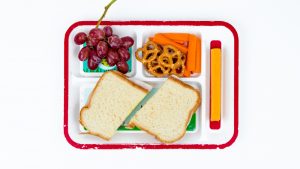
U.S. Rep. John Katko (R-NY) wants to ensure more at-risk and low-income children around the nation eat nutritious meals during the summer.
“For far too many children in our community, the only nutritious meal that they receive is at school,” Rep. Katko said following his Aug. 14 visit to the Boys & Girls Clubs of Syracuse, N.Y. “This means that during the summer months, these children may go without healthy meals.”
Rep. Katko is cosponsoring the Summer Meals Act of 2017, H.R. 203, introduced last January by U.S. Rep. Don Young (R-AK). Specifically, H.R. 203 will amend federal law to redefine “areas in which poor economic conditions exist” — and where the Summer Food Service Program (SFSP) for children may operate — as areas where at least 40 percent (currently 50 percent) of the children have been determined to be eligible for the government-run free or reduced-price school meals, according to the congressional record summary.
The bipartisan H.R. 203 has 50 cosponsors, with U.S. Rep. Brian Fitzpatrick (R-PA) joining Reps. Katko and Young as the only GOP members among them.
Rep. Katko would like to see a larger number of community-based organizations participate in the U.S. Department of Agriculture’s Summer Food Service Program (SFSP), the federally funded, state-administered program that reimburses providers who serve free healthy meals and snacks to children and teens age 18 and younger in low-income areas during the summer months when school is not in session.
“Childhood hunger and malnourishment have lasting impacts on a child’s health, education outcomes, and future competitiveness in the workforce,” said Rep. Katko. “In Congress … I’ve been a steadfast supporter of the Summer Meals Act to strengthen, protect and ensure access to the summer nutrition programs.”
SFSP meals are served at a variety of sites located in low-income areas, such as the Boys & Girls Clubs of Syracuse, as well as at faith-based locations, libraries, childcare facilities, public schools, and other non-profit community organizations that also offer learning, enrichment and recreational activities for children.
As SFSP sponsors, they enter into agreements with state agencies to run the SFSP and may manage multiple sites. The Boys & Girls Clubs of Syracuse, for instance, which teams up with the Syracuse City School District and the Food Bank of Central New York, provides more than 200 meals every day to local children, according to the congressman’s office.
However, the programs are often difficult to administer due to a lack of transportation and administrative red tape, Rep. Katko’s staff said.
By lowering the concentration of poverty threshold for the percentage of eligible children who may participate in the SFSP, H.R. 203 would spur more sponsors to participate in the program, according to the congressman’s statement.
Additionally, H.R. 203 would allow local government agencies and private nonprofit organizations to feed children year-round through the SFSP; provide funding for transportation grants to fund new approaches and mobile meal trucks; and permit all SFSP sites to serve a third meal, among other provisions.
H.R. 203 has been under consideration by the U.S. House Education and the Workforce Committee since being introduced on Jan. 3, 2017.



